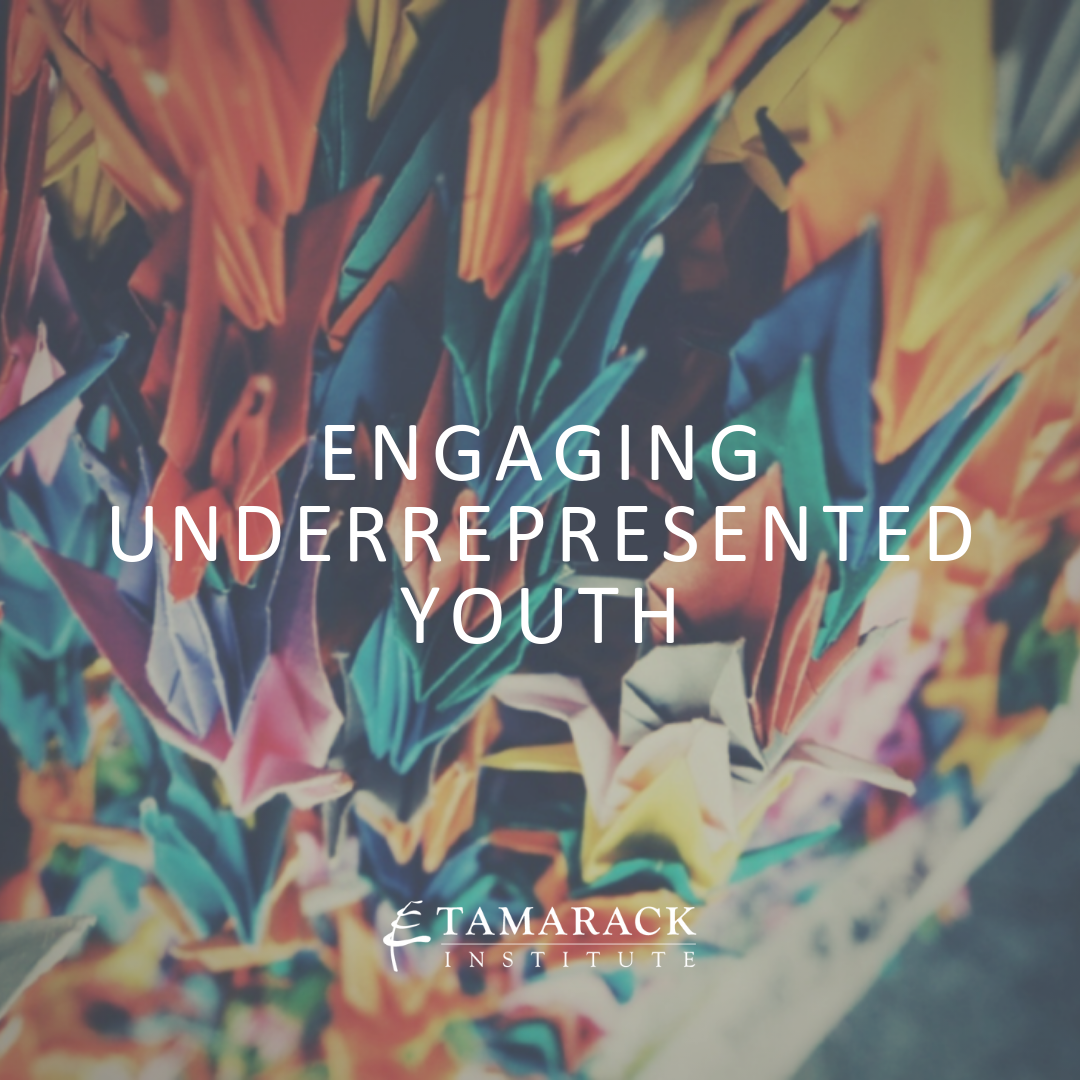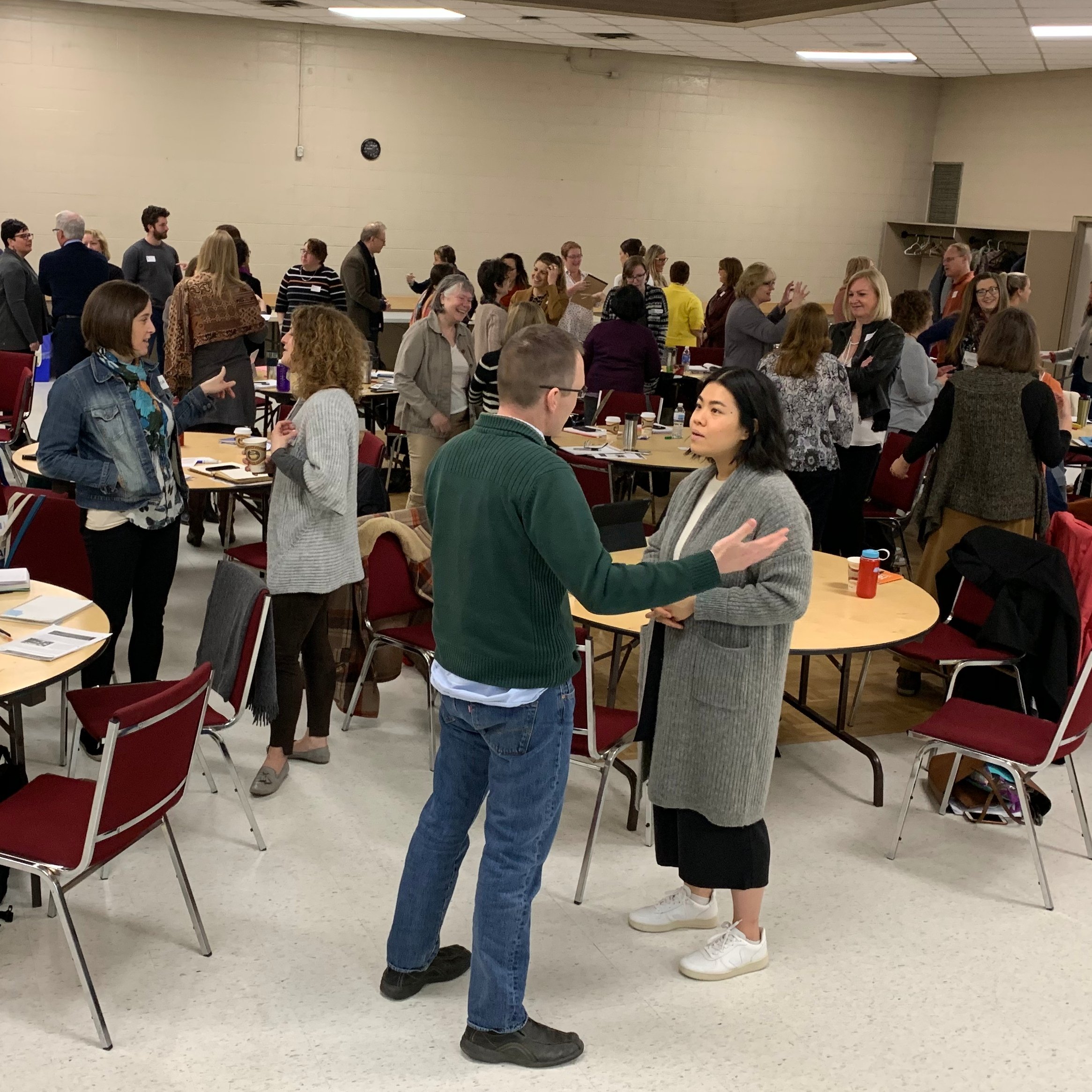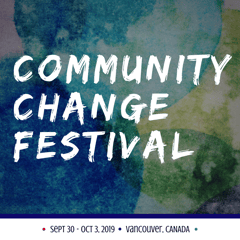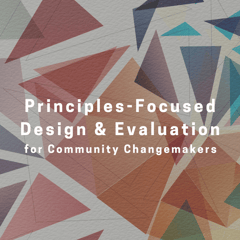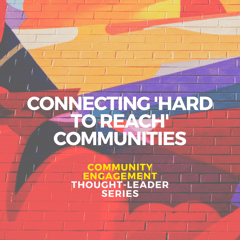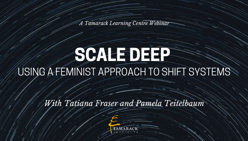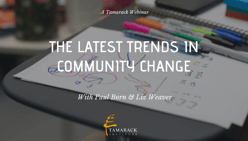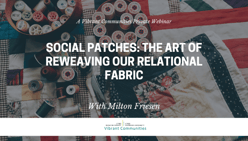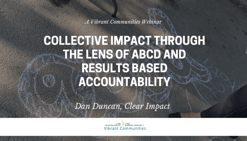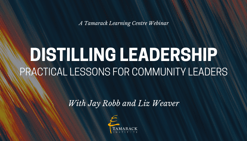Tamarack Institute | September Edition, 2019
BE THE CHANGEMAKER
BY: JANE HUMPHRIES
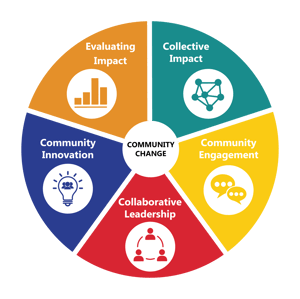
As summer draws to a close and you begin your journey into Fall, we invite you to join us in Vancouver from September 30 to October 3 for the Community Change Festival. The festival is a gathering of thought leaders, practitioners, and citizens from around the world, all focused on bringing meaningful community change to their organizations and communities by exploring 5 practice areas that lead to effective community change.
In my role at the Leaning Centre, I provide leadership and guidance across the 5 practice areas in the development of workshops, events and consulting services for our learners. The Community Change Festival is the perfect opportunity to access all these vehicles in one place – coaching opportunities, connections to others leading change initiatives, expert presenters, exposure to leading thinkers, the latest tools and resources, and time for reflection on being a community changemaker.
The Community Change Festival is about building the five interconnected practices that are vital to getting to impact when tackling complex community challenges. Tamarack Learning Centre Directors and leading Canadian and International experts in each of these five areas have crafted in-depth workshops that explore the latest thinking and identify the challenges and opportunities inherent in leading effective community change initiatives.
But the 3.5-day Festival is first and foremost a celebration. A celebration of your tenacity in leading on the issues that are most important to your community, a celebration of our diversity, of the impact we create each and every day, of our search for solutions to complex problems, and a celebration of the stories we share.
The Community Change Festival will be an intensive learning experience. It will give you the space to immerse yourself in the theory, practice, and experiential learning that we are seeing evolve across the community change landscape in Canada.
The conversation is no longer around a new approach to facing complex problems. People all across the country have learned from the past and have adopted new and innovative ways of working to address systems-level challenges. The conversation now is do you have the skills and competencies to achieve success working in this way?
.png?width=3000&name=CCF%202019%20Learning%20Arc%20Website%20Launch%20(1).png)
The Festival offers a variety of ways we will share stories and dig deep into the knowledge and skills that are required to lead effective community change:
- Skills workshops focused on each of the 5 practice areas, lead by content experts
- Immersive Learning Experiences in Vancouver where you will see first hand change in action
- Private Screening of the Great Bear Rain Forest film at the IMax Theatre in Science World British Columbia.
- Plenary sessions with thought leaders who will share their community change stories and experiences
- Advanced learning stream for Systems Changemakers
- Closing keynote address with George Aye on Power, Privilege and being the Changemaker you need to be.
We invite you to join us for an amazing celebration and to explore Being the Changemaker!
Learn More:
- Visit the website for a complete listing of the Community Change Festival activities
Share this article:
Building a Common Agenda for Collective Impact
BY: ELLE RICHARDS
A common agenda is a common understanding of the problem and a shared vision for change. It is a necessary component of Collective Impact and an important consideration in the development of a poverty reduction strategy that requires an ongoing process of community engagement.
An expressed challenge within the Cities Reducing Poverty learning community early on is often how to get to a common agenda for Collective Impact.
The guide, Foundations for Building a Common Agenda, was developed with this in mind; to support communities in understanding the process and ingredients to move from building the energy to developing a community-wide common agenda. Importantly, this guide draws on real-life experiences of Cities Reducing Poverty members who have progressed through these early phases with success and utilizes their own tools where possible.
This guide was produced to provide an overview, with examples, to help organizers and collaboratives at the early stage of poverty reduction work:
- Understand a proven engagement process in order to develop an informed and sustainable community plan
- Identify milestones and actions to help track progress
- Access a compendium of resources that can guide through the process of achieving these milestones
The guide also provides key principles, or tips, to consider when laying these foundations, to set communities up for success ahead of implementing a community plan.
Learn More:
- Read Foundations for Building a Common Agenda
- Read How to Develop a Common Agenda for a Collective Impact
- Check out The Common Agenda Framework Tool
Share this article:
The Evolving Practice of Community Change: A Multisolving Approach
BY: SYLVIA CHEUY
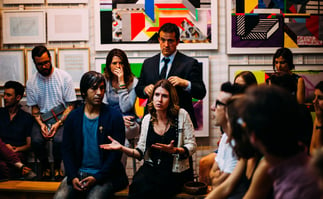 The field of community change is maturing as a growing global network of changemakers works across multiple scales, in innovative ways to address an array of intractable problems. One of the highlights of my role at Tamarack is the opportunity to work alongside – and learn from – collaborative initiatives across Canada, the US, and beyond. This gives me a “front-row seat” on the ingenuity of communities and a unique opportunity to note new and emerging practices and trends in the field of community change.
The field of community change is maturing as a growing global network of changemakers works across multiple scales, in innovative ways to address an array of intractable problems. One of the highlights of my role at Tamarack is the opportunity to work alongside – and learn from – collaborative initiatives across Canada, the US, and beyond. This gives me a “front-row seat” on the ingenuity of communities and a unique opportunity to note new and emerging practices and trends in the field of community change.
One of the most interesting frameworks I’ve come across recently is Multi-solving. Born in the climate action sector, Multisolving offers changemakers a new way to reimagine how communities can effectively champion positive change. Instead of using collaboration to work on a single issue, Multisolving facilitates work on a variety of different, but interrelated issues simultaneously. My latest paper Changing How I Think About Community Change dives into the practice of Multisolving and draw parallels between it, Collective Impact, and other multi-sector collaborative approaches to identify five insights for how I see the work of community change evolving. These include:
- Working beyond organizations to leverage multi-sector networks and build movements for change
- Creating impact through both program improvements AND systems change innovations
- Reimagining leadership by rethinking relationships and how we work together
- Addressing complexity and scale with the power of simple rules and small actions
- Recognizing our interconnection by moving beyond debate and championing equity
As I reflect on how the field of community change is changing, the words of the Sufi poet Rumi come to mind: “Yesterday I was clever, so I wanted to change the world. Today I am wise, so I am changing myself.” I am particularly struck by how much the work of community change requires changemakers to be willing to look inward and consider how we need to change ourselves while, at the same time, encourages us to stay open to discovering and incorporating new frameworks for how to mobilize diverse partners work together in new and ever-effective ways to make positive community change happen.
Learn More:
- Read the paper Changing How I Think About Community Change
- Check out Tranform TO: A Multisolving Case Study
- Build your skill as a community change-maker by joining us at the Community Change Festival in Vancouver, BC from Sept 30th to Oct 3rd
Share this article:
Are You Prepared for an Emergency?
BY: GLENDA COOPER
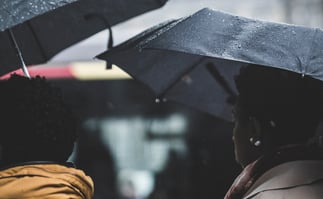 We are often told to be prepared for an emergency by having 72 hours worth of supplies on hand. Equally important is getting to know and build relationships with your neighbours.
We are often told to be prepared for an emergency by having 72 hours worth of supplies on hand. Equally important is getting to know and build relationships with your neighbours.
In fact, these relationships are essential during an emergency and in the days following an extreme weather event when emergency personnel are overwhelmed. During an emergency your first responder will likely not be a first responder; it is more likely that a neighbour will be the first person on the scene.
Recognizing the need for these connections during extreme weather events, the Lighthouse Project piloted three models for establishing neighbourhood-based resiliency hubs or networks. These models built on existing assets in the community; starting with who was already interested emergency preparedness, response and recovery. Each model was different in its approach; one started with municipal government, another with community organizations and the third with a group of interested residents. All three shared the goal of wanting to create safe places, ‘resiliency hubs,’ for people to gather, connect and access supports during an extreme weather event.
Despite the differences in the approach to each of the pilot sites, similar key learnings emerged:
- Extreme weather emergencies are becoming more frequent, we all need to prepare
Building the neighbourhood-based social connections and resilience hubs should become a part of every municipality’s emergency management plan.
- Creating an emergency response strategy requires time
Engaging multiple people in the conversation takes time but is integral to building the networks essential for disaster response and recovery.
- Collaboration is essential for building an effective, actionable strategy
Building a robust climate resilience strategy requires a collaborative funding approach between all levels of government, insurance companies, community foundations and others.
- Faith Groups play an integral role in Resilience Hubs
As familiar landmarks in vulnerable neighbourhoods, faith based organizations have the facilities and networks that make them important catalysts for 'resilience hubs.'
- Testing models and sharing learning are catalysts for developing best practices
Connecting communities across the nation to share best practices and lessons learned in ‘neighbour-helping neighbour’ emergency response models is key to expanding the work.
Each model had unique strengths and challenges; and, each one also successfully enhanced their neighbourhood’s resilience to extreme weather events. Their success is encouraging! It demonstrates that it doesn’t matter whether you are starting at the municipal, organizational or resident level, if you start with who is already at the table, resilience is possible!
Learn More:
- Read: Case Study | Building a Neighbourhood-Based Urban Climate Adaptation Infrastructure
- Read: Annotated Bibliography | Emergency Preparedness
- Join: The Citizens & Emergency Preparedness Community of Practice
Share this article:
ENGAGING UNDERREPRESENTED YOUTH
By: Liz Weaver
Watch the Recording
CREATING TRANSFORMATIONAL EXPERIENCES
By: Lisa Attygalle
Read the Post
IDEAS FOR EMPOWERING LIVED/LIVING EXPERIENCE
By: Bee Lee Soh
Read the Post
ASSET-BASED COMMUNITY DEVELOPMENT AT A GLANCE
By: Vibrant Communities
Read the Guide
HIPPOCRATIC OATH FOR COMMUNITY WORKERS
By: Jim Diers
Read the Post
HOSTING GREAT VIRTUAL MEETINGS
By: Maggie Chumbley
View the Recording
Community Change Festival
September 30 - October 3 | Vancouver BC
Join changemakers from near and far to deepen your knowledge of the 5 practices needed to move your community change agenda from idea to action to impact. Learn the latest thinking, understand your role as a changemaker, and replenish your toolkit with practical ideas and tools you can use in your own community.
- Meet our Festival Faculty who will be speaking in panel discussions, running workshops, and delivering keynotes
- Start your learning now by viewing the resources we've prepared in advance of the festival
- Network and work with peers from Canada, the US, Australia, New Zealand, South Africa, and beyond!
Time is running out, so be sure to register soon! Equip Yourself as a Community Changemaker
Principles-Focused Design & Evaluation for Community Changemakers
September 9 - London, ON
September 10 - Toronto, ON
September 12 - Montreal, QC
Join evaluation expert Michael Quinn Patton and experienced evaluator Mark Cabaj in an intensive workshop that explores the principles-focused evaluation approach and demonstrates its relevance and application in a range of settings.
This workshop runs next week, so register today!
Learn How to Apply Principles-Focused Evaluation
Connecting 'Hard to Reach' Communities: A Community Engagement Thought Leader Series
October 7 - Edmonton, AB
October 10 - Toronto, ON
David Hanna, National Coordinator, Inspiring Communities, New Zealand and Director, Wesley Community Action will share his experience working with and engaging diverse communities across New Zealand. In this engaging and interactive workshop, learn the principles of community-led development that are central to the Inspiring Communities approach and support engaging all members of communities.
Learn More About Connecting 'Hard to Reach' Communities
Turf, Trust, and Collaboration: Practical Tools for Building Trust
October 17 | Waterloo, ON
December 6 | Hamilton, ON
Increasingly, communities are using collaboration to tackle some of their most complex issues. How can we do this effectively when we don’t build practices which engage others and build trust?
This interactive workshop focuses on the core leadership competency of trust building. Learners will walk away with ideas, tools and approaches to effectively engage diverse community partners and intentionally build trusting relationships and collaborative impact. Come prepared to share your experiences and insights in how to build trust.
Learn More About Building Trust

